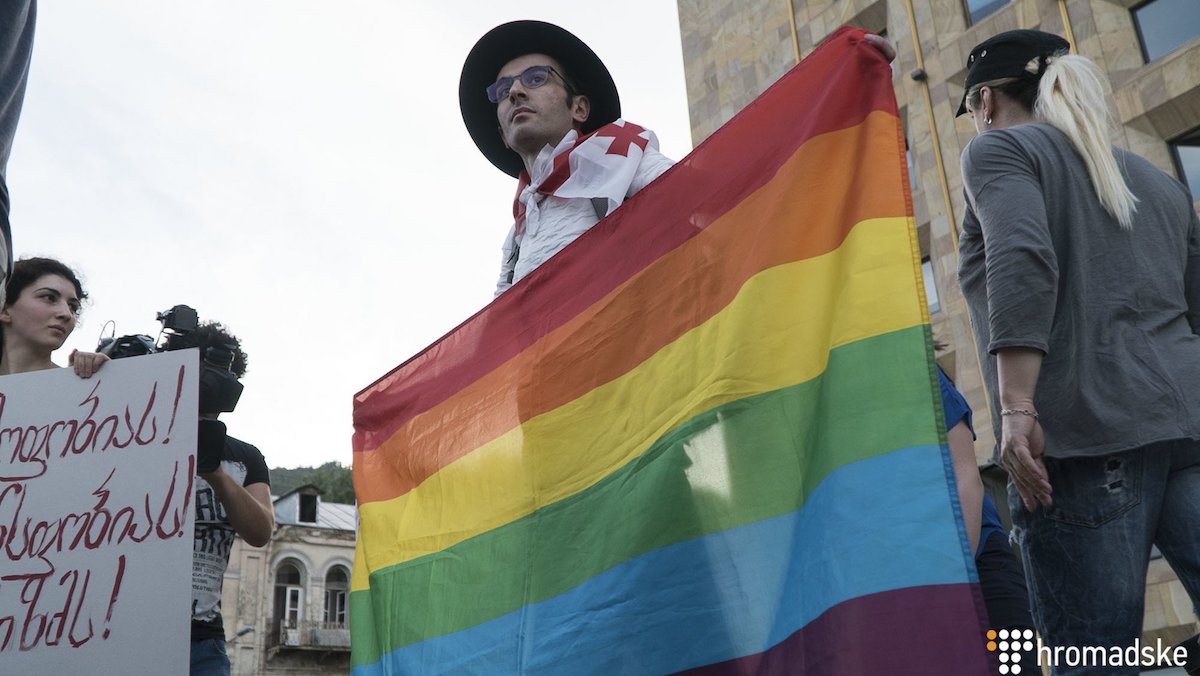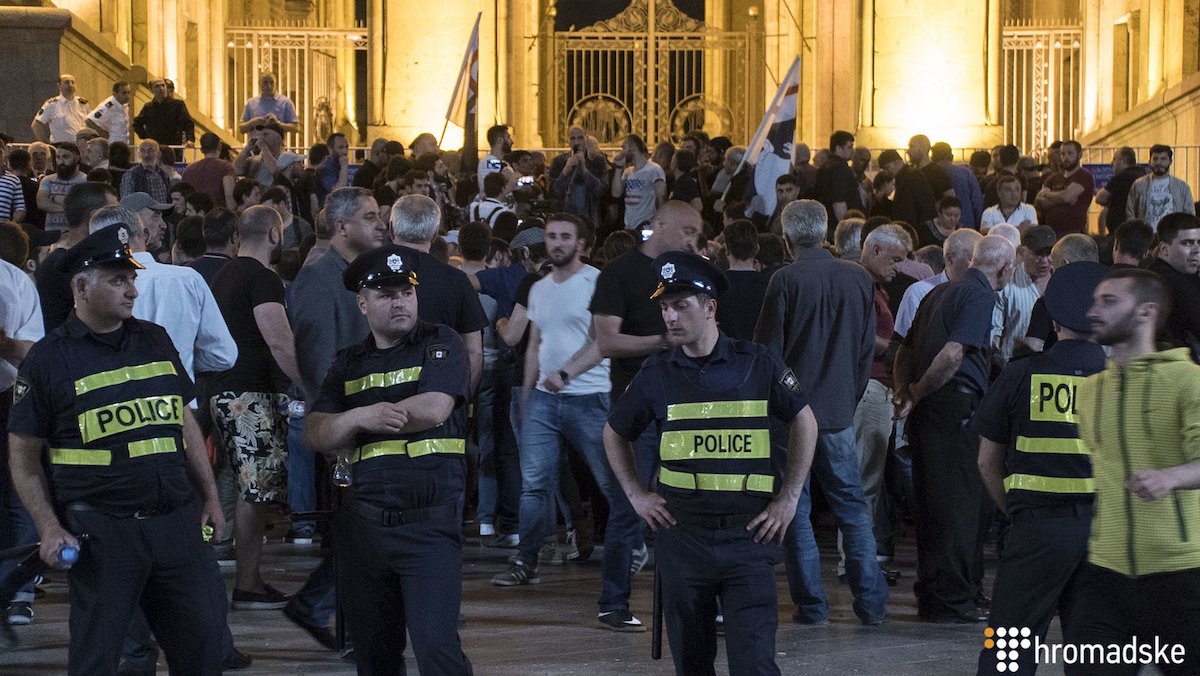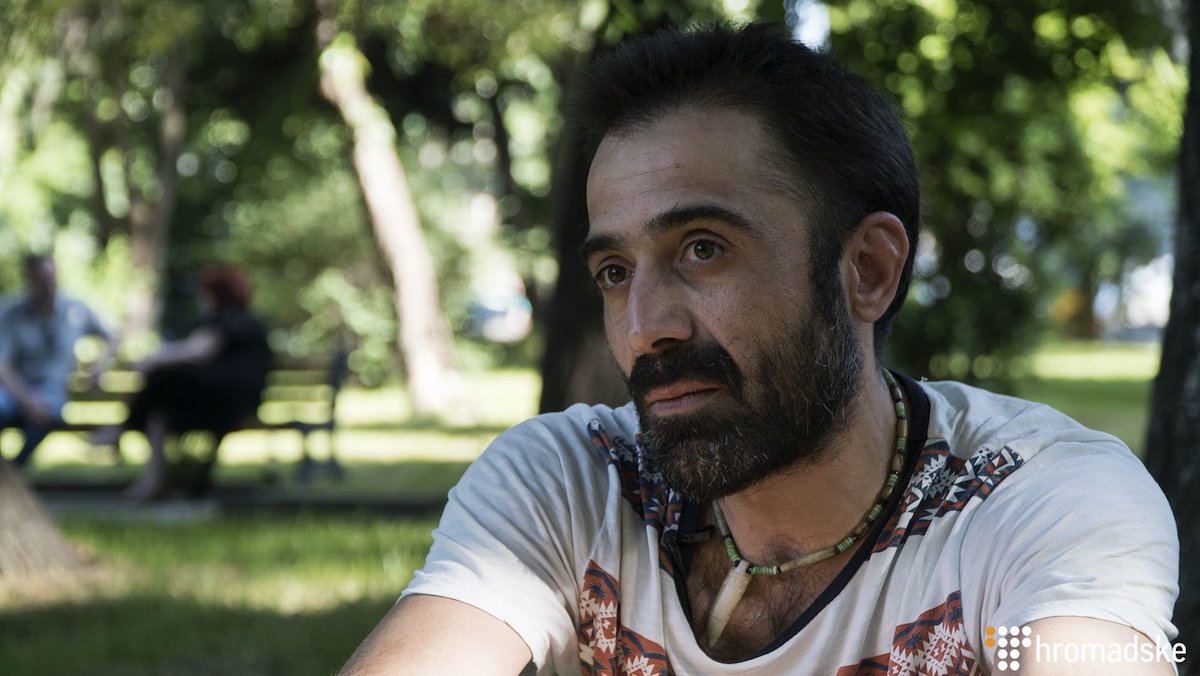Ukrainian journalists in Tbilisi: Georgians love Putin, not gays
Journalists from Hromadskoe TV channel arrived in Tbilisi on 17 May, on the day that the ‘For the Sanctity of the Family’ demonstration took place. The demonstration was against homophobia and was also a counter-protest of Georgian nationalists.
Several days before this a large youth demonstration took place in Tbilisi in front of the parliament building. The Protest was against police raiding night clubs in Tbilisi and came to be known as the ‘dancing’ protest.
Nationalists also came out against this protest, but run-ins were fortunately prevented.
“The dancing protest”
At the ‘Day of Sanctity of the Family’ demonstration, people knew about the 12-14 youth demonstrations but they said that they haven’t come out against them specifically.
“We heard about it of course,” says Manana from Georgia. People of the older generation can speak Russian for the most part, but the youth is better acquainted with English.
“They want to legalise drugs, but that isn’t what we want, we’re against that. We’re Orthodox Christians, we must have family purity.”
There were men who seemed to be about 50-60 years old standing on the side. They said that they always come on 17 May with their families to march and then they relax. But as soon as we started speaking about the demonstrations in front of the parliament, their ‘peaceful’ attitude quickly took a turn.
Tengiz said that Georgia and Russia historically need to be together, and he then mercilessly cursed the former Georgian president Mikheil Saakashvili. He spoke of Americans with resentment, and his friend, who heard that we’re from Ukraine, advised us: “Be friends with Putin, and everything will be better.”
Despite the fact that LGBT organisations officially cancelled their events for 17 May – International Day Against Homophobia – a demonstration was still held in the evening in Tbilisi protesting homophobia. All those who were not afraid of the ultra-right groups were called to join the demonstration.

People say that they’ve come out not just against homophobia but against everything that is happening now in Georgia.
“I want to live freely, in calm, I want to be who I am. I am not a lesbian, I am simply a person. I am for freedom,” says 25-year-old Anna with bright red hair. Her friend Keti adds: “On the streets, one can see homophobia everywhere. I have been the victim of this homophobia on many occasions, and my 19-year-old son as well, because he has long hair.”
Most people who have come to the demonstration participated in the ‘dancing protests’ as well. Anna and Keti too. They call their far-right opponents ‘fascists’.
Just five-hundred meters from the government building, near the Georgian parliament, LGBT-opponents gathered, organised by ‘Georgian March’.
“We hate, excuse me for the expression, faggots and lesbians,” said Giorgi, who looks to be about 45 years old. “We’re Georgians, real Georgians and we love our country. Georgians live here – these aren’t Georgians. They’re not even believers.”

Drug policy and protests
On 19 May, the ‘dancing protests’ in Tbilisi were supposed to start again. But a day before, the White Noise movement (an organisation advocating for the decriminalisation of drug use and the main organiser of the events of 12-14 May) said that there would be no demonstration. One of the leaders of the organisation, David Subeliani, said that they need to find a new format for talking with the authorities.
In 2015, activists of the organisation were able to decriminalise the possession of marijuana held for personal use through the constitutional court. Now they are trying to decriminalise all drugs.

In 2017, the Georgian parliament made amendments which were put forward by the White Noise movement. Activists use Portugal as an example, where all drugs have been decriminalised since 2001 – including intravenous drugs, cocaine and heroine.
“We couldn’t just talk about marijuana or about club drugs,” explains David. “Because people who use intravenous drugs are in the worst condition. They are stigmatised, they have problems and their rights are infringed upon. If we want to change the system, then it must be changed for everybody.”
Between 2015 and 2016 the White Noise movement successfully cooperated with MPs who supported the idea of decriminalising drugs. They promised that they would pass the bill in Autumn 2017.
“Everyone told us we should wait, we can’t put pressure on them, it will work out. And we believed them. And then at some point I understood that I had become a part of politics. And politics is … well, they just tricked us. At some point we had gone from the streets into their offices. And everything ended there,” says David.
While the bill was put forward in parliament, nationalist organisations began a campaign against White Noise, says David. They asserted that the activists were putting forward a law to protect dealers and not consumers. The church also came out in full force against the bill, and as a result, the ruling Georgian Dream party did not look at the bill.
The dividing line
David Subeliani says that there will be no protests in the next two weeks. He notes that the situation concerning the decriminalisation of drugs has now gotten worse, and for that reason White Noise has decided to expand its agenda and not focus simply on the country’s drug policy.
“We want to raise the issue of human rights as a whole in Georgia,” David says, switching to English, which for him is easier than Russian. “This is the LGBT issue, the issue of fascism in Georgia. The issue of personal freedoms. And, of course, the issue of the country’s drug policy.”
Georgian journalist Dimitri Avaliani says that the divide in Georgia is deeper than it might seem at first glance. The growth of ultra-right and pro-Russian sentiments in Georgia is leading to a run-in of two camps: the conservative and liberal.
Representatives of the latter camp have fun in night clubs, are activists on the issue of drug decriminalisation and also support the rights of LGBT individuals.
The conservative side is for traditional views of the family and life styles and believes that the club-youth ‘wants to destroy the Georgian identity‘.
This is the side of society with which politicians and nationalists are working. The progressive youth is almost not supported at all, says Avaliani.
“Our youth are apolitical,” says Avaliani. “Nobody supports them. As a result, they practically don’t go to protest demonstrations. Once they came out because musicians were framed with drugs [in 2017, two rappers were arrested but were soon released after large protest demonstrations began], now they’ve come out because the state has crossed over into their territory. But they won’t come out for any political reasons. They’re not interested.”
Avaliani further says that the conflict between the two camps of society has been growing for a while now – it simply came out in full force and clarity during the ‘dancing protests’. After Mikheil Saakashvili became president in 2004, Georgia implemented a number of harsh and often unpopular reforms. Avaliani says that this has changed the mentality of Georgians for the better, but that it is not possible to entirely change the system.
“I hope that the pro-Russian sentiments in Georgia will not grow. But a dangerous precedent has been set. The conflict which we see now has not ended. It simply will reappear in another form. I hope that pro-Western parties and groups will be able to change the situation,” says Avaliani.



















